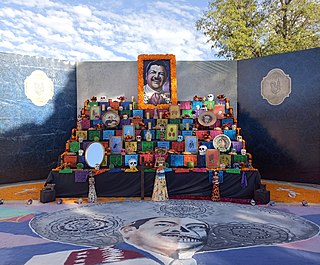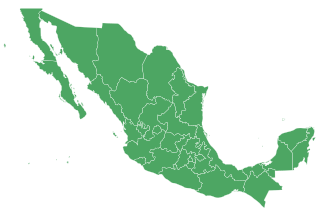
Gustavo Díaz Ordaz Bolaños was a Mexican politician and member of the Institutional Revolutionary Party (PRI). He served as the President of Mexico from 1964 to 1970. Previously, he served as a member of the Chamber of Deputies for Puebla's 1st district, a senator of the Congress of the Union for Puebla, and Secretary of the Interior.

José Alfredo Jiménez Sandoval was a Mexican singer-songwriter of rancheras, whose songs are considered the basis of modern Mexican music.

Timbiriche was a Mexican pop music group. The group started as a children's group in 1981 and managed to evolve successfully into adulthood.

Silvia Pinal Hidalgo is a Mexican actress. She began her career in the theater, venturing into cinema in 1949. She is one of Mexico's greatest female stars, one of the last surviving major stars from the Golden Age of Mexican cinema and part of the Golden Age of Hollywood for her film Shark! (1969). Her work in film and popularity in her native country led Pinal to work in Europe. Pinal achieved international recognition by starring in a famous film trilogy directed by Luis Buñuel: Viridiana (1961), El ángel exterminador (1962) and Simón del Desierto (1965).

Enrique Krauze Kleinbort is a Mexican historian, essayist, editor, and entrepreneur. He has written more than twenty books, some of which are: Mexico: Biography of Power, Redeemers, and El pueblo soy yo. He has also produced more than 500 television programs and documentaries about Mexico’s history. His biographical, historical works, and his political and literary essays, which have reached a broad audience, have made him famous.

Anahí Giovanna Puente Portilla, known mononymously as Anahí, is a Mexican singer, songwriter and actress. In 1986, she started her acting career when she was cast on Chiquilladas. After working on many successful telenovelas produced by Televisa, including Alondra (1995), Vivo por Elena (1998), El Diario de Daniela (1998) and Mujeres Engañadas (1999), her first leading role was in Pedro Damián's production, Primer Amor... A Mil por Hora (2000). In 2003, she joined the cast in Clase 406. Anahí reached international success in 2004 after starring in Rebelde and being part of the twice-nominated for a Latin Grammy Award group RBD, who sold over 15 million records worldwide. In 2011, she starred in Dos Hogares, her last telenovela to date.

Angélica María Hartman Ortiz, known professionally as La novia de Mexico, is a Mexican actress and singer. Her songs El hombre de mi vida peaked at No. 6, Reina Y Cenicienta peaked at No. 9, Prohibido (Prohibited) peaked at No. 13, and El Taconazo peaked at No. 34 on the hot Latin songs chart.

Dulce María Espinosa Saviñón, simply known as Dulce María, is a Mexican actress, songwriter, singer and author.

Fernando Luján was a Mexican actor. He was a star of the silver screen in classic mexican films during the Golden Age of Mexican cinema.

Maite Perroni Beorlegui is a Mexican actress, singer, songwriter and producer.

César Roel Schreurs, best known as César Costa, is a Mexican actor and rock-and-roll singer.
Otto Sirgo is a Cuban actor and director of Mexican telenovelas and theater. He is the son of Cuban actor Otto Sirgo and Mexican actress Magda Haller and was married to Maleni Morales, also an actress, until her death in 2020. He starred in Recien Cazado along with Jaime Camil and Gabriela Vargas.
Lupita D'Alessio (Spanish pronunciation: [luˈpita ðaˈlesjo], born Guadalupe Contreras Ramos on 10 March 1954 in is a Mexican singer and actress. She is nicknamed La Leona Dormida.

Felipe Colombo Eguía is a Mexican-Argentine actor, singer and songwriter. He was part of the pop-rock band Erreway together with Camila Bordonaba, Benjamín Rojas and Luisana Lopilato.

Manuel Álvarez-Beigbeder Pérez, better known as Manuel Alejandro, is a Spanish composer of Latin love songs, which are better known as ballads. He has written, composed, and arranged songs for the likes of Luis Miguel, Plácido Domingo, Nino Bravo, Julio Iglesias, Raphael, Hernaldo Zúñiga, José José, José Luis Rodríguez, Emmanuel, Enrique Guzmán, Isabel Pantoja, Rocío Jurado, Rudy Marquez, and Jeanette, among many others.

YuridiaValenzuela Canseco, known mononymously as Yuri, is a Mexican singer, actress and television host. Yuri began her career as a teenage singer in her native country. In 1978 she released her first album titled Tú Iluminas mi Vida. She gained recognition as a result of her participation in the Oti Festival in 1980. In the 1980s and early 1990s, Yuri established herself as one of the most popular pop music singers in Mexico and Latin America. Her vocal quality and versatility allow her to be incorporated into other musical genres, ranging from pop to dance, ranchera and tropical music genres. Thanks to her success and influence, she came to be considered the "Queen of Latin Pop".
The Festival Rock y Ruedas de Avándaro was a historic Mexican rock festival held on September 11–12, 1971, on the shores of Lake Avándaro near the Avándaro Golf Club, in a hamlet called Tenantongo, near the town of Valle de Bravo in the central State of Mexico. The festival, organized by brothers Eduardo and Alfonso Lopez Negrete's company Promotora Go, McCann Erickson executive and sports promoter Justino Compean and Telesistema Mexicano producer Luis de Llano Macedo, took place at the height of La Onda and celebrated life, youth, ecology, music, peace and free love, has been compared to the American Woodstock festival for its psychedelic music, counterculture imagery and artwork, and open drug use. A milestone in the history of Mexican rock music, the festival has drawn anywhere from an estimated 100,000 to 500,000 concertgoers.

General elections were held in Mexico on 5 July 1970. The presidential elections were won by Luis Echeverría Álvarez, who received 86% of the vote. In the Chamber of Deputies election, the Institutional Revolutionary Party won 178 of the 213 seats, as well as winning all 64 seats in the Senate election. Voter turnout in the legislative elections was 64.4%.

Mi corazón es tuyo is a Mexican telenovela produced by Juan Osorio for Televisa. The telenovela is an adaptation of the Spanish TV series Ana y los 7. It was adapted in Mexico by Alejandro Pohlenz, Marcia del Río, and Pablo Ferrer.
Peñabots is the nickname for automated social media accounts allegedly used by the Mexican government of Enrique Peña Nieto and the PRI political party to keep unfavorable news from reaching the Mexican public. Peñabot accusations are related to the broader issue of fake news in the 21st century.















